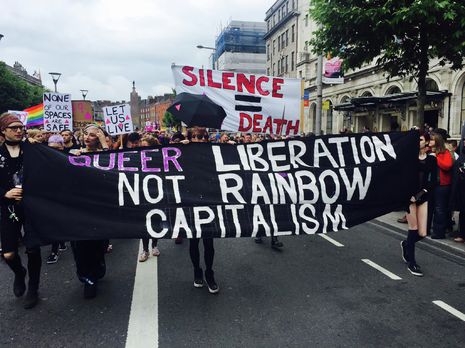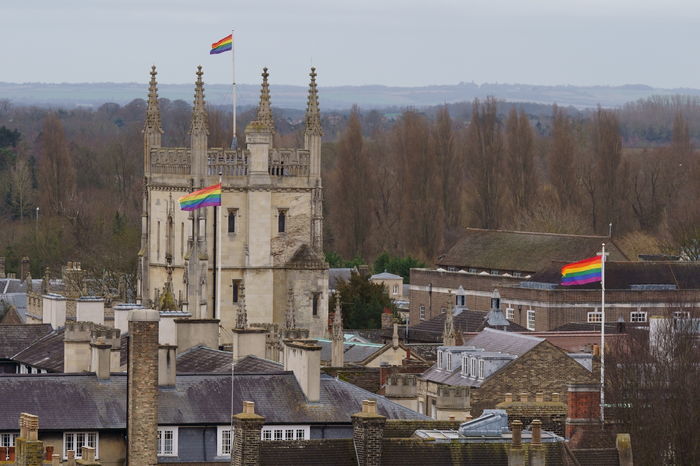Lesbian Visibility Week should inspire radical alternatives beyond capitalist-orientated representation politics
In the wake of the first ever Lesbian Visibility Week, Siyang Wei critiques the mainstream focus around the politics of representation and corporate sponsorship, suggesting that liberation lies instead in pursuing structural and material change.

Last week was the first-ever Lesbian Visibility Week and, as with everything these days, I found out about it on Twitter. Without knowing any more about it, as a lesbian, I was mildly excited; lesbian visibility had previously been limited to Lesbian Visibility Day, established on April 26th 2008. It was also an opportunity to draw attention to the particular difficulties young lesbians might be experiencing at the moment when so many are being forced physically back into the closet. For many students, going to university can be the first time we’re able to conceptualise our own desires and live lives we never dreamed of, away from homophobic family members or stifling home environments; the shutdown of campuses marks an abrupt and extreme end to this sense of possibility. Across the country, many young LGBT+ people are having to return to hostile family environments as their jobs and accommodation options disappear. Others still are facing homelessness at disproportionate rates.
“...visibility and ‘representation’ are useful, but only to a point.”
This context, however, also made it particularly jarring to scroll down the official Lesbian Visibility Week website and see that what appeared to be fun, patterned backgrounds are actually tesselated logos of large corporate sponsors – Tesco, GlaxoSmithKline, and Procter & Gamble, to name only a few. I also learned that Lesbian Visibility Week is run by Diva Media Group, “Europe’s biggest LGBTQI media group”, and that the headline contents of their survey and digital sessions were overwhelmingly geared towards experiences at work, networking events, and career progression. The caption for an Adweek article puts it quite plainly: “Lesbian Visibility Week isn’t just about putting a face to the community, it’s also about getting brands and advertisers to see queer women as a viable market.”
As a lesbian, I resent this and I find it sinister and exhausting rather than inspiring; visibility and ‘representation’ are useful, but only to a point. I’m glad that Diva were able to run a daily programme of sessions for lesbians and bi women, allowing people to interact digitally where the physical community is for now impossible. But the truth is that the problems on display are far from limited to Lesbian Visibility Week itself; they’re a symptom of the structural conditions of philanthrocapitalism. Crumbs of material and financial investment in the interests of marginalised people are squeezed out of large corporations in exchange for the uncomfortable feeling that their true motives lie in opening up the ‘queer women’ market. In a word, profit.
“It has never been enough for a lesbian CEO to be ‘visible’ while the system she valorises is the one that holds us all captive...”
I know that all the things we need to organise for our liberation cost money and that in this system money inevitably accumulates in the hands of a corporate ruling class. ‘Corporate social responsibility’ is about the rest of us asking nicely if we can please have some scraps, and I viscerally hate what this need to compromise has done to the mainstream face of LGBT+ ‘activism’. Lesbianism, in particular, is and always has been about so much more than commercialised visibility and corporation-approved representation; it’s about defending the possibility for women to have lives and desires that are oriented to each other, in which men can be completely irrelevant. Any lesbian will recognise how thoroughly women are still conditioned to imagine our existence in relation to male desire, and how difficult it is to escape. Corporate ‘visibility’ might feel like a salve, but as a project of liberation or (as Diva put it) ‘lifting up those who are most marginalised’, it’s doomed to failure from the start.
If we return to thinking about the problems lesbians and other LGBT+ people are facing now, it’s clear that they’re structural and material. What the lockdown highlights is how deeply the Thatcherite ideology of private household unit over any collective social responsibility has ravaged this country, and how vulnerable it makes LGBT+ people and others to abuse in the ‘home’ without recourse to refuge. What a lesbian project of liberation might mean, then, is the abolition of the private nuclear household as the basic unit of capitalist society and economy, which ties women to men through the nexus of biological reproduction. This is the material foundation for compulsory heterosexuality and homophobia, and this material foundation is also what ties LGBT+ people to unsupportive or abusive households.
I am lucky enough to be in lockdown with LGBT+ friends rather than with my own family, and to have forged new online spaces surrounded by fellow lesbians and bi women I know – but lesbian survival shouldn’t just be a matter of individual escape through relatively privileged circumstance. And while the mutual aid networks emerging across the country have been invaluable to saving countless lives, we should not be confined to redistributing our diminishing resources amongst ourselves while the ruling classes continue to turn a profit and the government divests itself of responsibility for our lives. It has never been enough for a lesbian CEO to be ‘visible’ while the system she valorises is the one that holds us all captive; this is a situation that calls for revolution. If the pandemic forces us to think more about how the neoliberal consolidation of the nuclear family can harm us, then it’s only appropriate to mark a week dedicated to lesbians by thinking seriously about how we can reimagine structural alternatives.
 Comment / College rivalry should not become college snobbery30 January 2026
Comment / College rivalry should not become college snobbery30 January 2026 Features / Are you more yourself at Cambridge or away from it? 27 January 2026
Features / Are you more yourself at Cambridge or away from it? 27 January 2026 Science / Meet the Cambridge physicist who advocates for the humanities30 January 2026
Science / Meet the Cambridge physicist who advocates for the humanities30 January 2026 News / Cambridge study to identify premature babies needing extra educational support before school29 January 2026
News / Cambridge study to identify premature babies needing extra educational support before school29 January 2026 News / Vigil held for tenth anniversary of PhD student’s death28 January 2026
News / Vigil held for tenth anniversary of PhD student’s death28 January 2026










